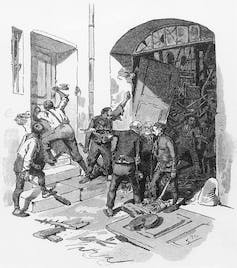The term “Luddite” emerged in early 1800s England. At the time there was a thriving textile industry that depended on manual knitting frames and a skilled workforce to create cloth and garments out of cotton and wool. But as the Industrial Revolution gathered momentum, steam-powered mills threatened the livelihood of thousands of artisanal textile workers.
Faced with an industrialized future that threatened their jobs and their professional identity, a growing number of textile workers turned to direct action. Galvanized by their leader, Ned Ludd, they began to smash the machines that they saw as robbing them of their source of income.
It’s not clear whether Ned Ludd was a real person, or simply a figment of folklore invented during a period of upheaval. But his name became synonymous with rejecting disruptive new technologies – an association that lasts to this day.
Questioning doesn’t mean rejecting
Contrary to popular belief, the original Luddites were not anti-technology, nor were they technologically incompetent. Rather, they were skilled adopters and users of the artisanal textile technologies of the time. Their argument was not with technology, per se, but with the ways that wealthy industrialists were robbing them of their way of life.

A wood engraving from 1844 depicts Luddites destroying power looms.
Archiv Gerstenberg/Getty Images
Today, this distinction is sometimes lost.
Being called a Luddite often indicates technological incompetence – as in, “I can’t figure out how to send emojis; I’m such a Luddite.” Or it describes an ignorant rejection of technology: “He’s such a Luddite for refusing to use Venmo.”
In December 2015, Stephen Hawking, Elon Musk and Bill Gates were jointly nominated for a “Luddite Award.” Their sin? Raising concerns over the potential dangers of artificial intelligence.
The irony of three prominent scientists and entrepreneurs being labeled as Luddites underlines the disconnect between the term’s original meaning and its more modern use as an epithet for anyone who doesn’t wholeheartedly and unquestioningly embrace technological progress.
Yet technologists like Musk and Gates aren’t rejecting technology or innovation. Instead, they’re rejecting a worldview that all technological advances are ultimately good for society. This worldview optimistically assumes that the faster humans innovate, the better the future will be.
This “move fast and break things” approach toward technological innovation has come under increasing scrutiny in recent years – especially with growing awareness that unfettered innovation can lead to deeply harmful consequences that a degree of responsibility and forethought could help avoid.
Why Luddism matters
In an age of ChatGPT, gene editing and other transformative technologies, perhaps we all need to channel the spirit of Ned Ludd as we grapple with how to ensure that future…



